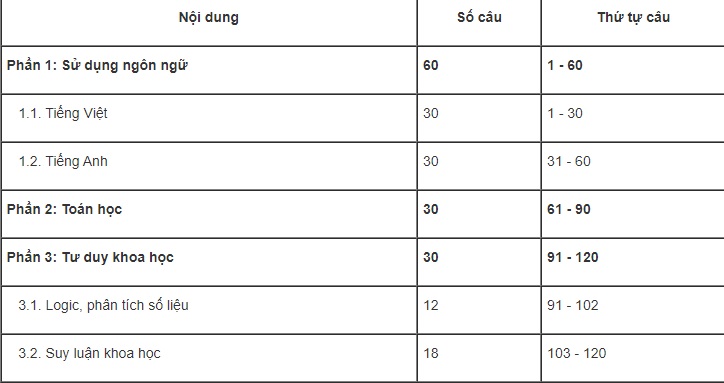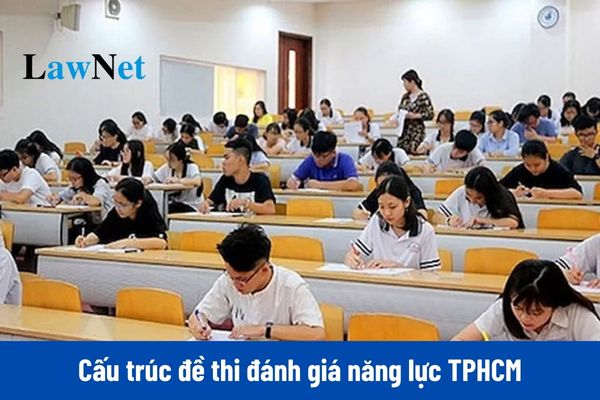What is the structure of question papers of the competency assessment exam 2025 held by Ho Chi Minh City National Parent University?
What is the structure of question papers of the competency assessment exam 2025 held by Ho Chi Minh City National Parent University?
On November 12, 2024, Ho Chi Minh City National Parent University announced the illustrative question papers of the competency assessment exam from 2025.
From 2025, the structure of question papers of the competency assessment exam held by Ho Chi Minh City National Parent University will be adjusted to align with the 2018 general education program.
The detailed structure of each part of the question paper is as follows:

- Language Usage and Mathematics Section: Ho Chi Minh City National Parent University will maintain the structure of the Language Usage and Mathematics section, while increasing the number of questions in these two sections to enhance the reliability and discrimination of the paper.
- Logic - Data Analysis and Problem Solving Section: restructured into the Scientific Thinking section to assess candidates' capabilities in logic and scientific reasoning when addressing real-world situations in fields of science, technology, economics, and society.
- Scientific Thinking Section: is designed to provide information, data, facts, experiment planning, experimental results, through which candidates are required to demonstrate the ability to understand and apply information, identify experimental results, predict patterns.
The competency assessment exam from 2025 still includes 120 objective multiple-choice questions with a 150-minute duration and is conducted on paper. Results are determined using a modern multiple-choice method according to question response theory. Each question’s score is weighted differently depending on the question's difficulty.
Scores are converted by section. The maximum score of the paper is 1,200 points, with the maximum for each component shown on the score sheet including Vietnamese 300 points, English 300 points; Mathematics 300 points, and Scientific Thinking 300 points.
In 2025, Ho Chi Minh City National Parent University will continue to organize the competency assessment exam with two sessions expected on March 30, 2025, and June 1, 2025 at 25 provinces/municipalities.
Download the sample question papers of the competency assessment exam 2025 held by Ho Chi Minh City National Parent University...Download

What is the structure of question papers of the competency assessment exam 2025 held by Ho Chi Minh City National Parent University? (Image from Internet)
Can universities in Vietnam autonomously organize competency assessment exams?
According to Article 60 of the Education Law 2019, the regulations are as follows:
Duties and powers of schools
1. Schools have the following duties and powers:
a) Publicly announce objectives, programmes, educational plans, conditions of education quality assurance, evaluation and accreditation results of education quality; systems of degrees/diplomas and certificates of schools;
b) Conduct admission, education, training, scientific research, transfer results of training and scientific research as appropriate of functions, duties and powers; to ratify or issue degrees/diplomas and certificates within authority;
c) Propose demands and participate in recruitment of teachers and labour workers in public schools; to manage and employ teachers and labour workers; to manage learners;
d) Mobilize, manage and utilize resources according to the law; to build up infrastructure in conformity with the requirements of standardisation and modernisation;
dd) To coordinate with learners' families, organisations and individuals in educational activities; to arrange for teachers, labour workers and learners to participate in social activities and community service.
2. The performance of duties, organisational structure, personnel and finance of public schools are regulated as follows:
a) Institutions of preschool education and general education shall implement democratic regulations in schools; be answerable to society, learners, authorities; ensure the participation of learners, families and society in school management. Management in institutions of preschool education and public institutions of general education shall be in accordance with the Government’s regulations;
b) Institutions of vocational education and higher education shall implement democratic rights and be held accountable in accordance with the Law on Vocational education, Law on Higher education and other relevant regulations.
3. People-founded schools and private schools shall exercise democracy and be responsible for their own development plans, organisation of educational activities, formation and improvement of teacher resources, mobilization, use and management of resources for the realisation of educational objectives.
Additionally, Clause 2, Article 34 of the Higher Education Law 2012 states:
Enrolment targets and enrolment organization
...
2. Enrolment organization:
a) The methods of enrolment include: entrance exams, profile evaluation or combination methods;
b) higher education institutions shall autonomously make decisions on the enrolment methods and bear responsibilities for the enrolment.
Thus, according to the above regulations, universities have the right to self-determine their enrollment processes, but they must have mechanisms and provide notifications to inform candidates.
What are the types of higher education institutions in Vietnam?
According to Clause 2, Article 7 Law on Higher Education 2012 (amended by Clause 4, Article 1 Law on Amendments to Law on Higher Education 2018), the types of higher education institutions in Vietnam are specified as follows:
- Public higher education institutions invested, maintained and represented by the State as the owner;
- Private higher education institutions invested and maintained domestic or foreign investors.
A non-profit higher education institution is one in which the investor declare that the institution does not run for profit as written in the decision to permit its establishment or conversion; the investor will not withdraw capital or receive dividends; the annual accumulated profit shall be considered non-distributable property and will be used as reinvestment in such institution.
Only conversion from a private higher education institution to a non-profit private higher education institution is permitted.

- Vietnam: What is the sample report on a modern literary matter - innovations and renovations in the short stories "Chiếc thuyền ngoài xa" and "Một người Hà Nội"?
- Vietnam: What are the 05 sample 600-word argumentative essays on negative issues among youth today? How many types of texts are there in the content of the 12th-grade Literature curriculum?
- Vietnam: What are the best sample paragraphs about your family for 6th-grade students? What elective subjects do 6th-grade students learn?
- Vietnam: What are the best sample self-introductions in English for 5th-grade students? What topics are covered by the 5th-grade English curriculum?
- Vietnam: What are the sample imaginary paragraphs on Tin-tin and Mi-tin entering the magical garden for 4th-grade students? What are the 05 essential qualities required for 4th-grade students?
- Vietnam: What are the guidelines for preparing the briefest lesson "A Strange Tale of the Fisherman's House/Truyện lạ nhà thuyền chài"? What is the eligibility for lower secondary graduation recognition for 9th-grade students?
- What are the enrollment methods of Pham Ngoc Thach University of Medicine in 2025?
- Vietnam: What are the sample 1st end-of-semester question papers of 9th-grade Literature? What is the form of assessment for 9th-grade Literature?
- Vietnam: What are the 10 sample 200-word social argumentative paragraphs on the strength of discipline? Is improving manpower one of the goals of education?
- What are the sample social argumentative essays on a social issue raised from a literary work in the 8th-grade Literature curriculum in Vietnam?

